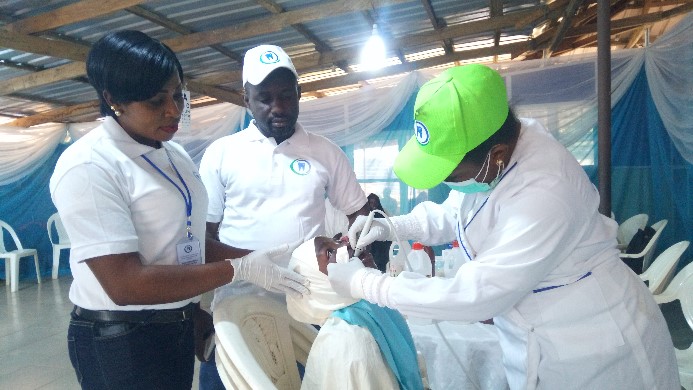‘Over 25% of Nigerian dental technologists practicing abroad’
Over 25% of Nigerian trained dental technologists do not practice in the country because of lack of an enabling environment, according to the Registrar of the Dental Technologists Registration Board of Nigeria, (DTRBN) Malam Idris Bappah Gwaram. He made the disclosure on Friday in Abuja when he led a delegation on a visit to the […]

FILE PHOTO: L-R: A dental technologist with the Whitestone Dental Initiative (WDI), Patience Ori Adadu, Programme officer Al-Habibiyyah Islamic Society (AIS), Mallam Nurudeen Adeleke and the founder, WDI Macpherson Pamela, operating a patience during the two-day dental and optical outreach for FCT residents, in Abuja
Photo by: Abbas Jimoh.
Over 25% of Nigerian trained dental technologists do not practice in the country because of lack of an enabling environment, according to the Registrar of the Dental Technologists Registration Board of Nigeria, (DTRBN) Malam Idris Bappah Gwaram.
He made the disclosure on Friday in Abuja when he led a delegation on a visit to the National Information Technology Development Agency (NITDA).
- Dental amalgam: Age-long treatment no longer safe for teeth
- Bayero university inducts 39 medical doctors, 14 dental surgeons
Dental Technology is a branch of dentistry which specializes on the fabrication of orofacial prostheses for the replacement of lost oral and facial tissues or correction of congenital and acquired defects.
Gwaram said there were about 5,000 Nigerian registered dental technologists but that 25% of them prefer to work in United Kingdom, United States of America, (USA), Asian countries and even other African countries because of lack of requisite equipment to practice in the country.
The board is seeking NITDA’s partnership for manpower development in Information Communication and Technology (ICT).
Gwaram said dental technology was moving from analogue to digital practice, adding that ICT development would help his staff to acquire more skills, ease their work and ensure quality service delivery.
He said: “Computer Aided Designs/ Computer Aided Manufacturing (CAD/CAM) is now being employed efficiently in the practice.
“Impression taking with Alginate and tray is gradually being replaced by digital impressions viz the use of oral cameras.
“Thus, updated knowledge on modern practices in the ICT industry, particularly use and maintenance of computer systems and other hardware, database administration, use and understanding of the internet in daily operations, is key in the effective performance of any institution globally.
“I believe our agencies can work together to achieve the level of advancement necessary for efficient oral health care delivery and public service,” he added.
Director General of NITDA, Kashifu Inuwa, who was represented by Oladunji Vincent, director of e-government development and regulation, promised to provide the needed support for the dental board.
He added that NITDA had developed some programmes under its e-government master plan to bring Ministries, Departments and Agencies (MDAs) together to move government’s transactions online to ensure quality delivery.
